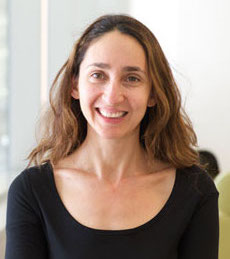April 26, 2022
Two Borough of Manhattan Community College (BMCC/CUNY) professors have been awarded prestigious National Endowment for the Humanities (NEH) summer stipends to continue developing their innovative research projects.
Academic Literacy and Linguistics Professor Sharon Avni has been awarded an NEH summer stipend of $6,000 to write a chapter for her book manuscript, “Speaking of Hebrew: Language and identity in contemporary American Judaism.”
Modern Languages Professor Sophie Maríñez has been awarded an NEH summer stipend of $6,000 to complete her manuscript on the representation of violence in literature, political discourse and cultural works produced in Haiti and the Dominican Republic between the 1790s and 1990s.
A reinterpretation of history reconstructs Afro-diasporic experiences

Professor Sophie Maríñez’s book project, “Spirals in the Caribbean: Representing Violence in Haiti and the Dominican Republic,” reinterprets the legacy of colonial violence in the Caribbean and examines the literary and cultural history of Haiti and the Dominican Republic across three centuries.
In doing so, she says, the research “responds to calls for deploying indigenous tools to reconstruct Afro-diasporic experiences and to interrogate Western concepts that keep recirculating, transformed, through Caribbean experiences.”
Some of the material she analyzes includes mythological figures and oral traditions, literary works dealing with mass murders, and cultural resistance to colonialism.
The NEH Summer Stipend award is the second of two national awards Professor Maríñez has received for her book.
In 2021, she was awarded the Mellon/ACLS Fellowship for Faculty at Community Colleges, which allowed her to take time off from teaching to conduct additional research and continue writing her manuscript.
This most recent award “is a welcome recognition that my research is in the right path, which is a great feeling,” says Professor Maríñez, who recently became a member of the doctoral faculty at the Graduate Center and the Series Editor of the Caribbean Series at Brill, a long-standing academic press in Europe.
In Fall 2021, she was also a Visiting Scholar at the University of Connecticut, where she gave a talk on her research, workshopped a chapter-in-progress from her manuscript, visited classes, and met with recently-hired faculty of color to talk about the challenges of winning tenure.
Professor Maríñez credits the NEH award, in part, to the support she has received at CUNY over the past 10 years.
“Small grants from BMCC and the PSC, for instance, and previous fellowships from the Graduate Center and CUNY Central allowed me to get crucial release time from my teaching load to maintain an active scholarship agenda,” she says. “Due to recent budget cuts, most of these small grants which support work in the humanities have either disappeared or been reduced, but we cannot forget the importance of the humanities for developing broader perspectives, critical thinking and other important skills among our students. Faculty in the humanities, especially at community colleges, need that support.”
Research examines modern Hebrew as a powerful emblem of Jewish identity

“My book project explores how American Jews use and think about modern Hebrew to identify themselves and claim diasporic and religious authenticity,” says Professor Sharon Avni. “Specifically, it asks what role language plays for speakers whose attachment and motivations are not tethered to linguistic inheritance or nationality.”
The award, the second of two national awards Professor Avni has received in recent years, supports her research drawing on theoretical and methodological frameworks in linguistic anthropology, religious studies, and cultural and media studies.
“As a result, the project will offer a new analytic framing for understanding how Modern Hebrew functions as a powerful emblem of American Jewish identity in the 21st century,” she says.
An earlier project, “The Languages of Religious Institutions in New York City: Integrating Discovery-Based Research into the Linguistics 100 Curriculum,” was awarded a CUNY Research in the Classroom Idea grant. She also won a Mellon/ACLS fellowship for her project, “Hebraists by Choice: American Jews and the Mobilization of Modern Hebrew.”
Among these significant awards is a reality that will resonate with other academic researchers, she says, and that is having applied for grants that she did not at first, receive.
“As was true with the Mellon/ACLS fellowship, I was rejected for the NEH summer stipend the first time I applied for it, but I reapplied after having had more time to work through my data and tighten the framing of my research — and that application was accepted, so I am a big believer in not giving up after rejection.”
In addition to rethinking some aspects of her research before submitting again for the NEH grant, “reaching out to colleagues at BMCC and other universities for feedback was crucial in sharpening my argument,” she says. “I think this is especially true for studies like mine which are interdisciplinary in nature and seek to contribute to varying scholarly conversations.”
An applied linguist who teachers Language and Culture, Forensic Linguistics and other courses at BMCC, Professor Avni has found that her research project “has directly informed my teaching, as it has made me acutely aware of the need to consider my students’ language practices through the lens of religion — which needs to be discussed in connection to race, class, gender and ethnicity.”
Faculty research projects relate to BMCC Strategic Goals including Strategic Goal 6: Strengthen BMCC’s role in a thriving NYC and as a leading community college nationally.
STORY HIGHLIGHTS
- Two professors each receive $6K NEH summer stipends
- Professor Sharon Avni will work on her book manuscript, “Speaking of Hebrew: Language and identity in contemporary American Judaism”
- Professor Sophie Maríñez will complete her manuscript on the representation of violence in literature, political discourse and cultural works produced in Haiti and the D.R. between the 1790s and 1990s

